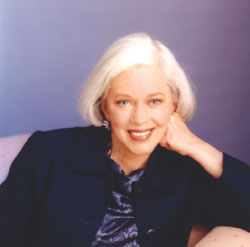|
 Columbia
Nursing Dean Hopes to Transform Profession Columbia
Nursing Dean Hopes to Transform Profession
by Merri
Rosenberg
To
hear Mary O’Neil Mundinger, Dean of the Columbia University
School of Nursing and the Centennial Professor in Health Policy,
explain it, the much discussed nursing shortage has less to
do with an actual shortage of nurses as with the way the profession
is structured.
“There
isn’t a shortage of nurses, but a shortage of rewarding
jobs,” said Dr. Mundinger, who holds a doctorate in public
health from Columbia University’s School of Public Health.
“20 percent of all licensed nurses aren’t working
in nursing. They’re teaching, selling real estate, or
pursuing other options. Of the 2.6 million nurses in the country,
500,000 of them aren’t working in the profession. The
crisis is a hospital crisis, because the jobs are not configured
to reflect the level of expertise that nurses have. Younger
nurses are leaving the field faster than older nurses, because
they are dismayed by the disparity between the responsibility
levels that are there, and the authority levels that aren’t.”
Dr. Mundinger does concede, however, that there is a shortage
in advanced practice care nursing, with many primary care positions
going unfilled. 
Not to worry. Like any good health care practitioner, Dr. Mundinger
has a remedy at hand. Through the Columbia University School
of Nursing, a new degree proposal is being considered by the
university, leading to a doctor of nursing practice, that, as
she provocatively put it, “will revolutionize nursing
and change how people think about nursing.”
The doctor of nursing practice will offer a terminal degree
for nursing professionals who want to go beyond even the master’s
level in specialty fields like primary care, psychiatric mental
health, nurse anesthesia, acute care, and nurse midwifery, among
many others, that the School of Nursing currently offers.
“The
idea with having a doctoral degree is to have the nursing profession
recognized at the same level of authority and accountability
as other health professions,” Dr. Mundinger said. “It
is radical, and one of those tipping point things that will
help with the re-engineering of hospital-based nursing.”
Dr. Mundinger is also working on developing exit boards for
the new doctorate, beyond the licensing system that is already
in place, as a way to “provide a quality credential for
what nurses are already doing.” She has established a
faculty practice in nursing for her school’s professors,
and in 1997, created a midtown Manhattan primary care practice,
staffed by nurses.
During her impressive career, Dr. Mundinger–a mother of
four and grandmother of seven who lives in suburban Westchester
County–has been a forceful advocate for removing many
of the barriers between nursing and medicine, and is working
to develop a clear, professional role for nurses.
Perhaps her vision stems from her undergraduate experience at
the University of Michigan, where, Dr. Mundinger recalled, “we
nursing students took anatomy at the medical school, and we
thought we were just as important as the doctors.”
Raised in Fredonia, New York—a small, rural upstate
town—by a mother who was a teacher and a father who was
a business executive, Dr. Mundinger grew up with an implicit
understanding that her career choices were either nursing or
teaching. She began her vocation as an obstetrics/gynecology
nurse in Ithaca, New York, moved into intensive care nursing,
earned a master’s degree in nursing education, and was
awarded a fellowship to become a family nurse practitioner.
Dr. Mundinger also received a prestigious Robert Wood Johnson
Health Policy fellowship, which brought her to Washington as
a staff member for Senator Edward Kennedy on the Senate Labor
and Human Resources Committee.
She was also tapped by former president William Clinton to serve
on the health Professionals Review Group, which analyzed the
health care reform plan spear-headed by then- First Lady Hillary
Rodham Clinton. Widely published in the fields of nursing and
health policy journals, Dr. Mundinger is also the author of
Home Care Controversy: Too Little, Too Late, Too Costly and Autonomy
in Nursing.
Dr.
Mundinger has long thought that the future of nursing education
is in better educated nurses, with advanced degrees. When she
became dean of the nursing school in 1986, Dr. Mundinger began
the process of transforming the nursing school from an undergraduate
college, comparable to Columbia College or Barnard, to a purely
graduate school, offering master’s degrees to those who
already had earned a bachelor’s degree. Since 1988, the
Columbia program has only offered graduate degrees.
The School of Nursing, which enrolls about 500 students a year
(and had about 200 when Dr. Mundinger first stepped into the
Dean’s role), attracts a diverse student population, with
twice the national average of under-represented minorities,
like African-American men and Hispanics. Many of the students
have earned undergraduate degrees from places like Stanford,
Princeton, Barnard, Yale, and Berkeley, among others.
“We
want to educate young people about the marvelous opportunities
in the field of nursing,” Dr. Mundinger said. “We
want high school guidance counselors to encourage those interested
in a health career to consider nursing. We’re looking
for people who have a clear idea of what they’ll do with
their education.”#

Education
Update, Inc., P.O. Box 20005, New York, NY 10001.
Tel: (212) 481-5519. Fax: (212) 481-3919.Email: ednews1@aol.com.
All material is copyrighted and may not be printed without express
consent of the publisher. © 2002.
|
